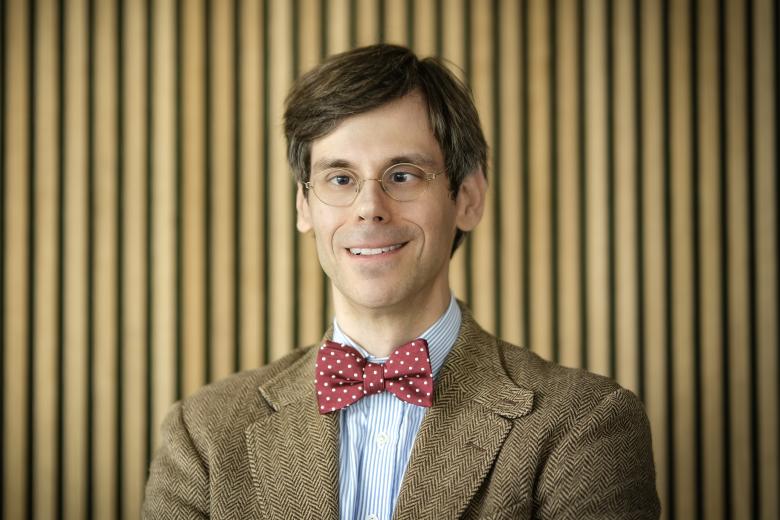Liberal Arts: to get good at being
On 1 July 2017, Prof. Teun Dekker became the first Professor in Liberal Arts and Sciences Education in Europe. His main duties will be creating public awareness of Liberal Arts in the Netherlands and abroad, and conducting research on Liberal Arts education in the European context as well as its social, political and educational significance.
We met with Prof. Dekker to get a better understanding of his professorship and his vision on what Liberal Arts and Sciences is and why it is important.
Hi Teun, please introduce yourself
Howdy there, I’m Teun. Officially, I’m the Vice-Dean of Academic Affairs at University College Maastricht (UCM), but I prefer to think of myself as an analytical political philosopher, teacher, performer, miner for truth and delusion, lover and sharer of fun and beautiful things.
You are the first person in Europe to obtain the title of Professor of Liberal Arts and Sciences Education. What does that mean?
Yes, it’s rather cool. The word professor comes from the idea of professing, of talking about what you really believe in. And I really believe in Liberal Arts. So the idea is that I will be some kind of ambassador for Liberal Arts, and write and lecture about why Liberal Arts matters, for democracy, for the labour market, but mainly for living a good life, so that the world gets a better understanding of what the Liberal Arts movement is all about.
Does this mean some things are going to change for you?
Of course I will still teach, try to improve the curriculum, do little jobs here and there, and cheer up students when they are glum. So the only change is that you must now bow when you enter my office and leave it walking backwards…I’m joking of course.
Haha, not too many changes I understand. So tell me, what is Liberal Arts to you?
Liberal Arts is many things to many people. For some, it allows them to study everything and anything, because they want to learn about the world in every way possible. For some it’s an opportunity to study exactly the specific things they are interested in. For others it’s a chance to try out different things to discover their true passion. And for some people it’s an opportunity to avoid certain subjects and methodologies. But, regardless of the reason one studies Liberal Arts and Sciences, it’s always about becoming the best, smartest version of yourself, to get good at being.
What is the reason someone should pursue a study in Liberal Arts?
Your mind is an amazing thing. It is capable of containing so much knowledge, making so many links between ideas, understanding so much, and constructing so many arguments. But it can only realize its potential if you develop it, and expose it to an environment that stimulates your entire brain. Liberal Arts colleges do that better than any other environment.
What is the future of Liberal Arts in academia and in the labour market?
In both the labour market and academia what will matter is whether you are good, not what you are good at. If you are good at thinking, putting information together, working together with other people, solving problems, you will be fine no matter what you have studied. So I believe that in the future, people will appreciate Liberal Arts more, and more students will be studying in programmes like UCM.
What are things that you look forward to see in the future at UCM?
I really look forward to the day when we can do more with performing arts, especially theatre. We are working on it, but doing that in the context of an academic programme is tricky. I think you can learn so much from performing Shakespeare, not only about yourself, but also about society, politics and the human mind. And the ability to stand in front of people and really communicate with them is so important. Whatever skills I have as a teacher come out of watching and performing a lot of theatre, and I wish more students had that experience.
T.J. Dekker
Teun J Dekker (1980) is Professor of Liberal Arts and Sciences Education at University College Maastricht, where he teaches courses on the intersection of the Social Sciences and the Humanities, including History of Political Thought and Distributive Justice in Contemporary Political Philosophy.
As Professor of Liberal Arts and Sciences Education, his main duties are:

-
The Need to Constantly Revisit Our Understanding of ‘Ownership’
On 12th November 2025, the Maastricht European Private Law Institute (M-EPLI), together with the Research Project “Revocable Properties”, organised a Roundtable on 'Novel and Recurrent Challenges in Ownership’, in which, next to more general-theoretical property questions, more in particular the...

-
Known Unknowns: A Macro-Meso-Micro Socioeconomic Approach to Uncover the Dark Number of Victims of Human Trafficking for the Purpose of Labour Exploitation
These last few weeks, Minister Paul of Social Affairs and Employment of the outgoing cabinet has been in the news for unilaterally deciding no longer to gradually phase out the Dutch regulation that allows temporary employment agencies to deduct a quarter of the minimum wage from migrant workers...

-
Sexual safety, the budget, and the final MUMC+ proposal
Dear members of the UM Community,
As the year approaches its end, the University Council can look back on a busy period. Our new members are becoming more and more familiar with the work of the Council and are making excellent contributions. Over the past few months, we have focussed on a range of...
